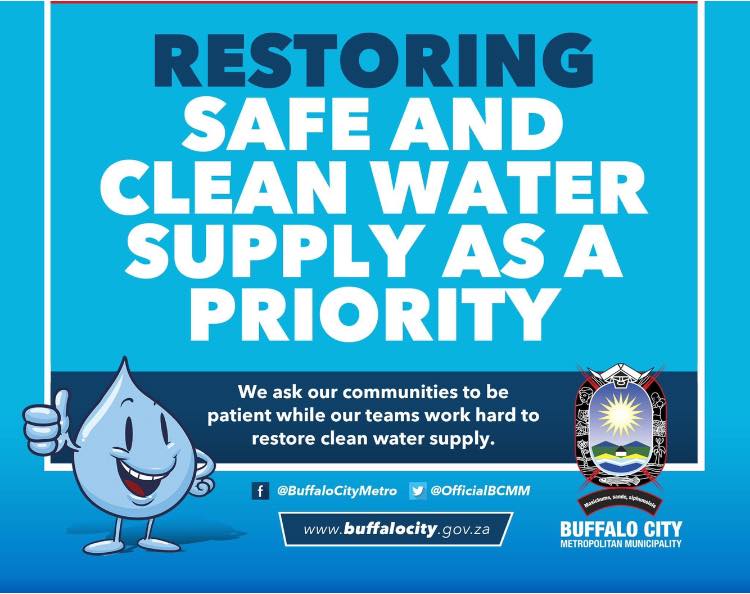
WATER RESTRICTIONS RELAXED TO STAGE 2
Buffalo City Metro moves from stage 3 of water restrictions to stage 2 water restrictions starting today 01 March 2022. This follows a decision by BCM Council on Monday 28 February 2022 after noting a monthly status report on the BCM dam levels and the mitigation strategies that are being implemente
The mitigation strategies will be implemented by exploring the pressure management and reduction on BCM’s infrastructure through installation of a number of Pressure Reducing Valves in its pipeline network. This will be supplemented with the Metro’s ongoing pipe replacement programme to rid the City of old infrastructure. Council then approved the easing of water restrictions in the Metro from stage 3 to stage 2 with 1 A punitive tariff.
The implementation of water restrictions and punitive tariffs as approved by Council is guided by the the dam operating rules, Municipal Water Services bylaw, Tariff policy, Credit Control Policy and Water Services Act 108 of 1997.
Even though, there is improvement in dam levels in some of the dams due to the recent rains in November/December 2021 and the flash floods in early January 2022 the drought situation is still rife as the major dams in the Amatole Water System are still low that is, the Wriggleswade Dam.
BCM receives raw water supply from six dams with one owned by the Metro, the Briddle Drift Dam, and five by the Department of Water and Sanitation. The five dams are in Amathole Water Supply System and they are the Laing Dam, Nahoon Dam, Rooikrantz Dam, Sandile Dam and Wriggleswade Dam.
Water restrictions and punitive tariffs are applied as per the current dam levels and are implemented at various stages (Stage 1 – Stage 5) as indicated below:
• Stage 1: Water Restrictions implemented in order to conserve about 10% of the current water usage. The purpose of this restriction is to cut down on inefficient water use (i.e. water wastage) and encourage consumers to use only the water they need. This stage will include consumer awareness campaigns on how to save water. • Stage 2: This stage is implemented when stage 1 does not bring the expected results. Implementation of stage 2 water restrictions with Punitive tariffs 1A to reduce consumption at about 20%.
• Stage 3: Implementation of Punitive Tariff 1B with restrictions to reduce consumption at about 35%.
• Stage 4: Implementation of stage 4 water restrictions, with Punitive Tariff 2 with to reduce consumption at about 50%
• Stage 5: Implementation of stage 5 water restrictions and Punitive Tariff 3 with when the available dam storage in sources of bulk supply is between 9 – 12 months.
The implementation of stage 2 water restrictions and punitive tariffs 1A will provide a relief to consumers as this punitive tariff provides no harsh measures and it is believed that the technical interventions planned and currently implemented will bear positive result that are required.
Punitive tariffs are implemented in order to reduce the water demand by eliminating the inefficient or non-essential water use until the next rainy season, to provide additional funding for implementation of drought interventions, to cover the revenue shortfall due to the anticipated reduction in water use due to the implementation of water restrictions, to provide funding for the additional raw water charges for the water released from the reserve dam (i.e. Wriggleswade Dam).
Punitive tariffs should not be regarded as a harsh measure of dealing with consumers but rather a conscientious one by the City if socio-economic activity is to be preserved in the long run, and the current pandemic is to be successfully managed.
Issued by BCM Communications
For enquiries contact: Buffalo City Metro Spokesperson Samkelo Ngwenya
Cell: 073 557 4707
Tel: 043 705 1143
Email : samkelon@buffalocity.gov.za
Twitter: @SamkeloNgwenya
2022-03-01
